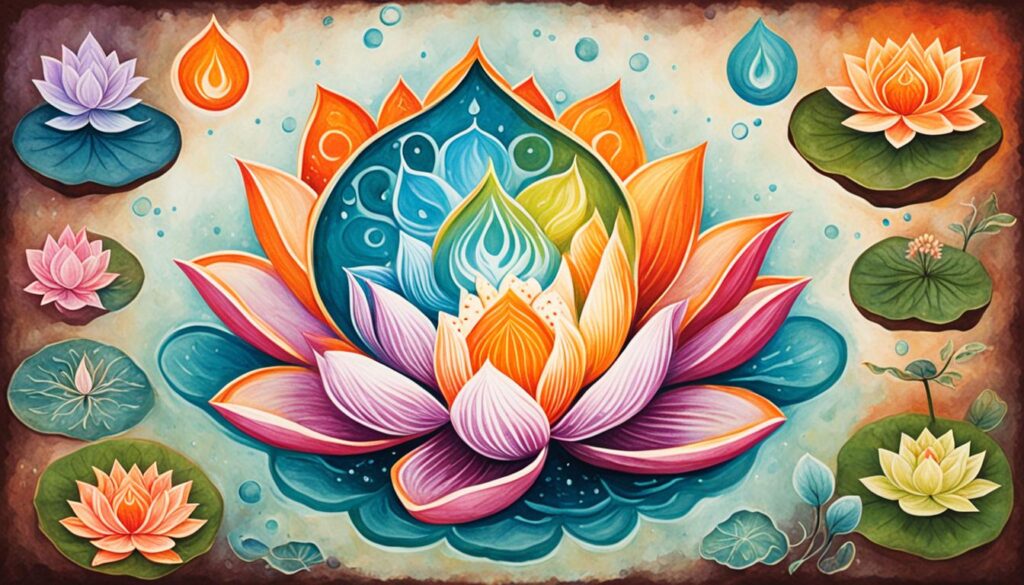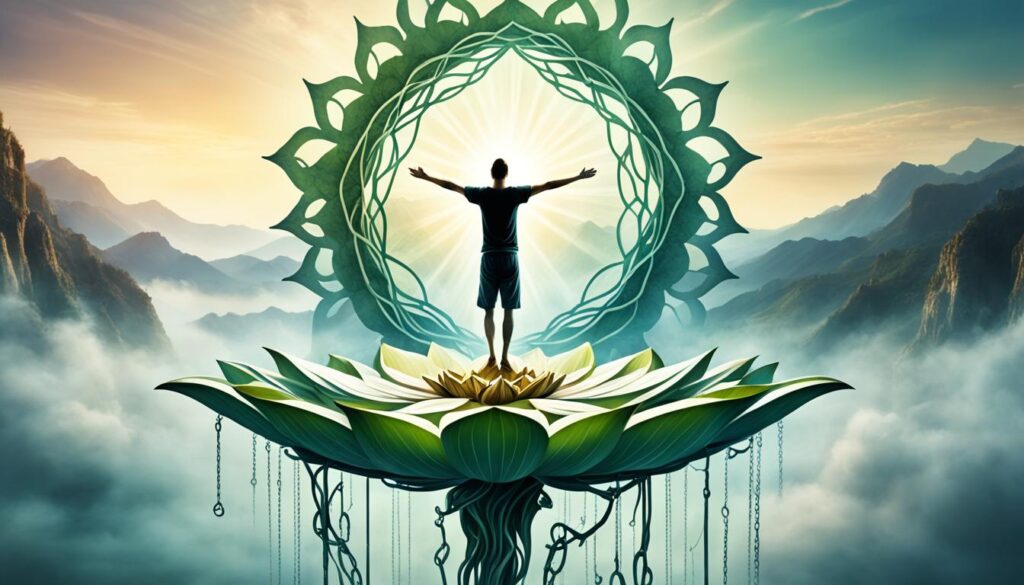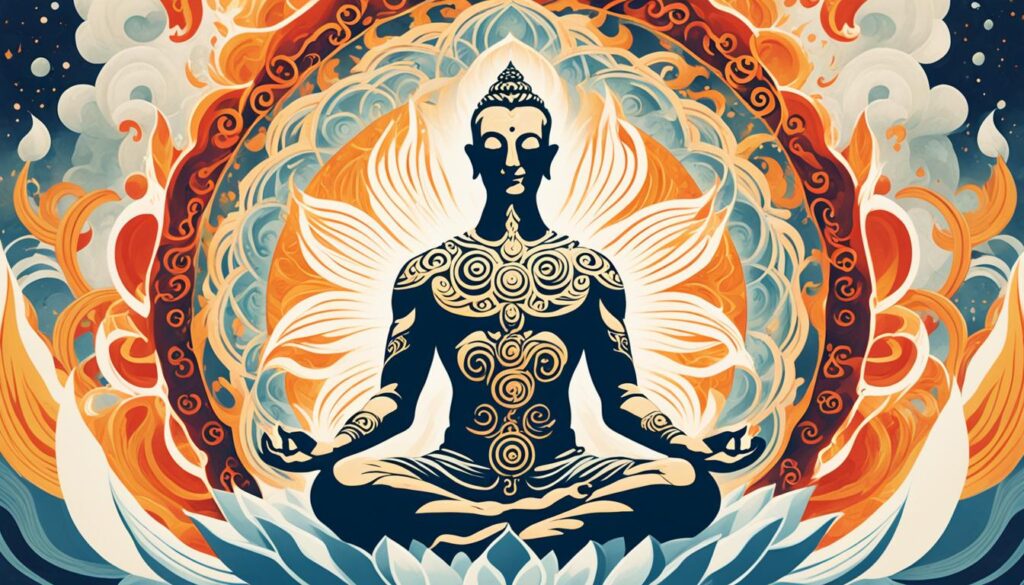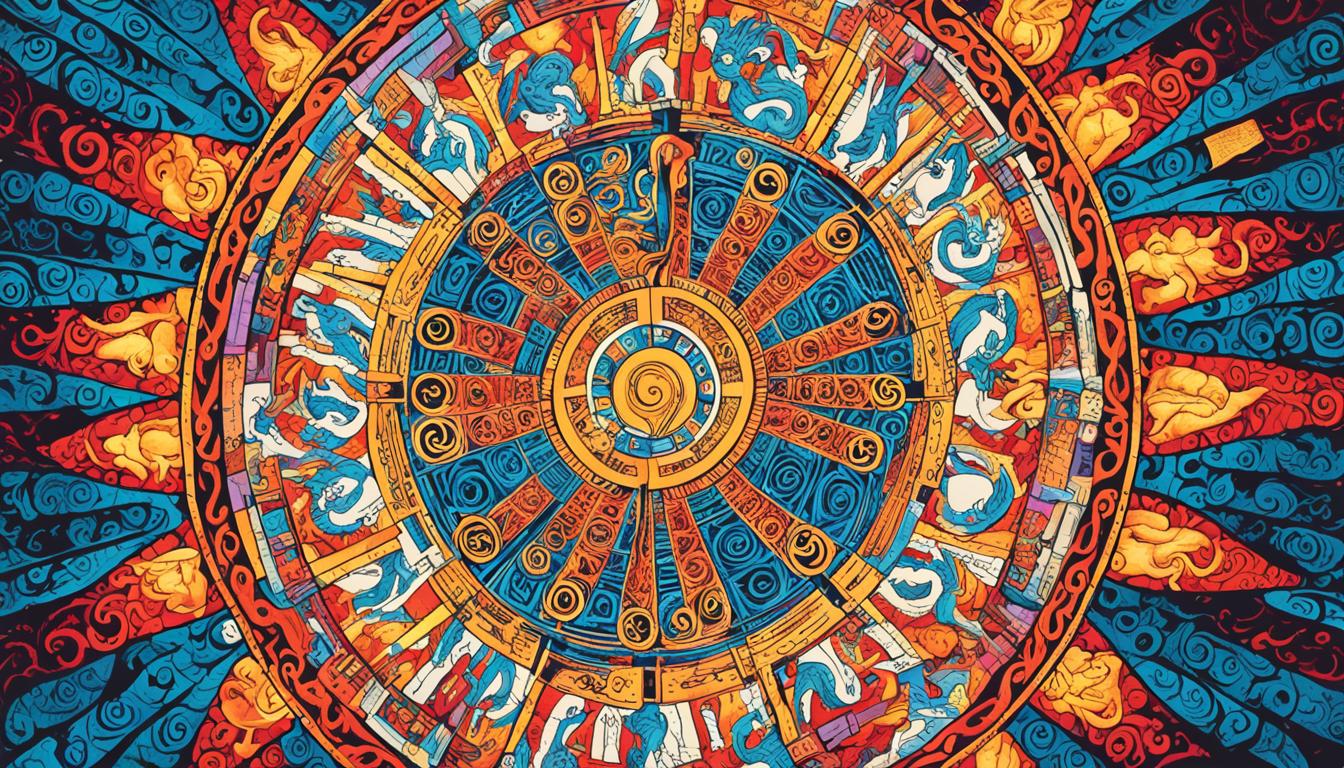Have you ever wondered about the meaning of life and the purpose of your existence? Are you curious to unravel the mysteries of the cycle of birth, death, and rebirth? If so, then delve into the profound concept of samsara, which is deeply rooted in Buddhism and Hinduism. Journey with us as we explore the significance of samsara and how it influences our spiritual path. Prepare to challenge your beliefs and discover the keys to liberation and enlightenment.
Key Takeaways:
- Understand the meaning and significance of samsara in Buddhism and Hinduism.
- Explore how the teachings of Buddhism and yoga can help you navigate the challenges of samsara.
- Discover the concept of liberation and how to break free from the cycle of rebirth.
- Learn how mindfulness, compassion, and self-realization play a role in escaping samsara.
- Recognize the interconnectedness of all beings and its importance in finding freedom from suffering.
The Impact of Buddhism’s Teachings on Samsara
Buddhism, with its transformative teachings, has had a profound impact on our understanding of samsara. The core principles of Buddhism, such as mindfulness, compassion, and wisdom, provide invaluable insights into navigating the challenges of daily life and finding harmony within ourselves and the world around us.

Mindfulness, one of the key teachings of Buddhism, encourages us to be fully present in the moment and to develop a deep awareness of our thoughts, emotions, and sensations. By practicing mindfulness, we can cultivate a profound understanding of the impermanence and inherent suffering in samsara. This awareness allows us to release attachments to transient and ultimately unsatisfying experiences, leading to a greater sense of inner peace and freedom.
Compassion, another central tenet of Buddhism, invites us to extend our care and understanding not only to ourselves but also to all sentient beings. Embracing compassion helps us break free from the self-centered perspectives that perpetuate suffering within samsara. Through acts of kindness and empathy, we can foster personal and societal harmony, creating a world characterized by love and interconnectedness.
The teachings of Buddhism also empower us to address modern challenges in a meaningful way. By cultivating wisdom, we gain insights into the true nature of reality and unmask the illusion of separateness that often fuels conflict and discontentment. With this understanding, we can navigate the complexities of the modern world with clarity, resilience, and ethical discernment.
Buddhism offers practical guidance on how to live a purposeful and enlightened life. By integrating the teachings of mindfulness, compassion, and wisdom into our daily routines, we can find personal fulfillment and contribute to the well-being of society as a whole.
By embracing Buddhism’s teachings, we can uncover a path to personal and societal harmony within the intricate tapestry of samsara. The profound wisdom imparted by Buddhism provides us with the tools we need to navigate the challenges of life, cultivate compassion for ourselves and others, and ultimately achieve a deeper understanding of our interconnectedness as we strive for liberation from the cycle of samsara.
What is Samsara in Hinduism?
In Hinduism, samsara is a profound concept that represents the continuous cycle of life, death, and rebirth. It embodies the journey of the soul through various bodies, realms, and states of being. Hindus believe that unless one achieves liberation or moksha, the soul will continue to be bound by the cycle of samsara. This cycle is influenced by the accumulation of karma, the consequences of one’s actions in past lives.
To understand samsara in Hinduism, it is essential to comprehend the concept of karma. Karma refers to the law of cause and effect, where every action has a consequence. The accumulation of good or bad karma determines the form of rebirth and the experiences one will have in each subsequent life. By accumulating good karma through righteous actions, selfless service, and devotion to the divine, individuals can break free from the cycle of samsara and attain liberation.
Samsara is deeply ingrained in Hindu philosophy and spirituality. It serves as a reminder of the impermanence and ever-changing nature of life. It teaches individuals to embrace the present moment and seek liberation from the cycle of suffering. Through spiritual practice, self-realization, and the pursuit of dharma (duty and righteousness), Hindus aim to transcend the limitations of samsara and achieve unity with the divine.

The Journey of the Soul in Samsara
| Stage | Description |
|---|---|
| Birth | The soul takes on a physical body and enters the material world |
| Life | The soul experiences various joys, sorrows, and challenges |
| Death | The physical body dies, and the soul transitions to the next state |
| Rebirth | The soul is born again into a new body, continuing the cycle |
| Liberation | The soul breaks free from samsara and attains moksha |
The table above illustrates the different stages of the soul’s journey in samsara. It emphasizes the repetitive nature of existence and the ultimate goal of liberation. Each stage offers an opportunity for spiritual growth, self-realization, and the purification of karma. The cycle of samsara serves as a transformative process for individuals to attain liberation and become one with the eternal and divine.
Breaking Free from Samsara: Escaping the Cycle of Rebirth
Breaking free from samsara is the ultimate goal for those on a spiritual path. It involves achieving liberation, moksha, or enlightenment. The journey towards liberation requires transcending attachment, desire, and ignorance, which are identified as the root causes of suffering. By cultivating wisdom, compassion, and self-inquiry, individuals can break free from the chains of karma and attain freedom from suffering. This process involves letting go of attachments, embracing the present moment, and realizing the interconnectedness of all beings. Breaking free from samsara is a transformative and liberating experience that brings a sense of freedom and peace.
To achieve liberation from samsara, one must embark on an inward exploration of the self. This journey involves self-reflection, self-discovery, and self-transformation. It requires a deep understanding of one’s desires, fears, and beliefs, as well as the recognition that these attachments and aversions perpetuate the cycle of suffering.
One powerful tool for breaking free from samsara is meditation. Through regular meditation practice, individuals can cultivate mindfulness and awareness, allowing them to observe their thoughts, emotions, and sensations without attachment or judgment. This practice supports the development of wisdom and insight, enabling individuals to see through the illusion of separateness and recognize the interconnected nature of all existence.
Practices for Breaking Free from Samsara:
- Cultivate mindfulness through meditation and daily mindfulness exercises.
- Develop compassion and empathy towards oneself and others.
- Engage in self-inquiry and contemplate the nature of reality.
- Let go of attachment to desires and outcomes.
- Embrace the present moment and find joy in simple pleasures.

Breaking free from samsara is not an easy journey, but it is a profoundly transformative one. It requires courage, discipline, and a willingness to face the inner challenges that arise along the way. However, the rewards are immeasurable – liberation from suffering, the attainment of enlightenment, and a deep sense of peace and freedom.
| The Cycle of Samsara: | Path to Liberation: |
|---|---|
| Continuous cycle of birth, death, and rebirth. | Transcending attachment, desire, and ignorance. |
| Rooted in the illusion of separateness and egoic identification. | Cultivating wisdom, compassion, and self-inquiry. |
| Characterized by suffering and dissatisfaction. | Attaining freedom from suffering and experiencing peace. |
| Aimless wandering and repetitive patterns of existence. | Embracing the present moment and finding purpose. |
| Driven by attachment to desires and aversion to pain. | Letting go of attachments and cultivating equanimity. |
The Concept of Samsara and Its Significance in Yoga
When it comes to the philosophy of yoga, the concept of samsara holds great significance. Yoga is not just a physical practice but a path to self-realization and freedom from suffering. Through the practice of yoga, individuals embark on a transformative journey towards breaking free from the cycle of samsara and attaining liberation.
Yoga philosophy encompasses various principles and practices that facilitate this process. By cultivating wisdom, compassion, self-inquiry, and equanimity, practitioners can develop a deep understanding of their true nature and the interconnectedness of all beings. This awareness allows them to let go of egoistic desires and attachments, which are considered the root causes of suffering.
In yoga, individuals are encouraged to embrace the truth of interconnectedness and live in harmony with the cycles of nature. By finding joy and gratitude in everyday life, they can experience freedom from suffering and move closer to the state of enlightenment.
The practice of yoga offers powerful tools for self-transformation and personal growth. Through asanas (physical postures), pranayama (breath control), and meditation, individuals can purify their bodies, calm their minds, and cultivate a deep sense of awareness. This heightened awareness allows them to observe their thoughts, emotions, and patterns of behavior, leading to self-realization and inner freedom.
Yoga teaches us to be present, to live authentically, and to embody our truest selves. It is through this process of self-discovery and self-transcendence that individuals can break free from the chains of samsara, liberate themselves from suffering, and ultimately achieve moksha – the state of liberation.

| Key Principles of Yoga | Benefits |
|---|---|
| Self-inquiry and self-awareness | Deep understanding of oneself and the world |
| Compassion and non-violence | Cultivation of empathy and kindness |
| Equanimity and balance | Emotional stability and mental clarity |
| Meditation and mindfulness | Greater peace of mind and stress reduction |
| Yama and Niyama (ethical guidelines) | Alignment with moral values and principles |
By incorporating these principles into their daily lives, individuals can transform their relationship with themselves, others, and the world. They can experience the profound freedom that comes with living in alignment with their true nature and the underlying unity of all existence.
Conclusion
Samsara, the continuous cycle of birth, death, and rebirth, is a profound concept that holds immense significance in Buddhism, Hinduism, and the practice of yoga. This eternal cycle is characterized by the inevitable suffering associated with worldly existence. However, breaking free from samsara is the ultimate goal for those on a spiritual journey, as it paves the way for liberation, moksha, and enlightenment.
By delving into the teachings and practices of Buddhism, Hinduism, and yoga, individuals can navigate the challenges of samsara and embark on a transformative path towards wisdom and compassion. Through the lens of Buddhism, mindfulness and compassion offer tools to connect with the impermanence and suffering present in samsara, ultimately leading to a deeper understanding of interconnection.
Hinduism, on the other hand, emphasizes the concept of liberation or moksha, achieved by breaking free from the cycle of samsara through spiritual practices, devotion, and the accumulation of good karma. Yoga, alongside its physical postures, teaches individuals to embrace self-inquiry, cultivate equanimity, and release egoistic desires and attachments. Through the practice of yoga, one can find freedom from suffering, experience self-realization, and move closer to enlightenment.
Ultimately, understanding the concept of samsara is crucial for anyone seeking personal and spiritual growth. By embracing the journey through samsara, exploring the teachings of Buddhism, Hinduism, and practicing yoga, individuals can navigate the cycle of rebirth, cultivate wisdom, and attain liberation and liberation.” Now start your journey, embrace the wisdom, and seek the liberation that awaits you.”
FAQ
What is samsara?
Samsara refers to the continuous cycle of birth, death, and rebirth, which is a fundamental concept in Buddhism and Hinduism.
What is the meaning of samsara?
The meaning of samsara is the state of continuous wandering or aimless wandering, where the individual soul is trapped in an endless wheel of life and suffering.
How is samsara defined in Buddhism?
In Buddhism, samsara is seen as a state of continuous rebirth and suffering, and liberation from samsara is the ultimate goal.
What is the significance of samsara in Hinduism?
In Hinduism, samsara is viewed as a journey of the soul through various bodies, realms, and states of being, with the ultimate aim of achieving liberation or moksha.
How can one escape samsara?
Escaping samsara involves attaining liberation, moksha, or enlightenment by transcending attachment, desire, and ignorance through spiritual practice, self-inquiry, and the cultivation of wisdom and compassion.
What is the concept of samsara in yoga?
In yoga, samsara is seen as the cycle of suffering and bondage to the material world. The practice of yoga aims to free individuals from this cycle and attain self-realization and liberation from suffering.

